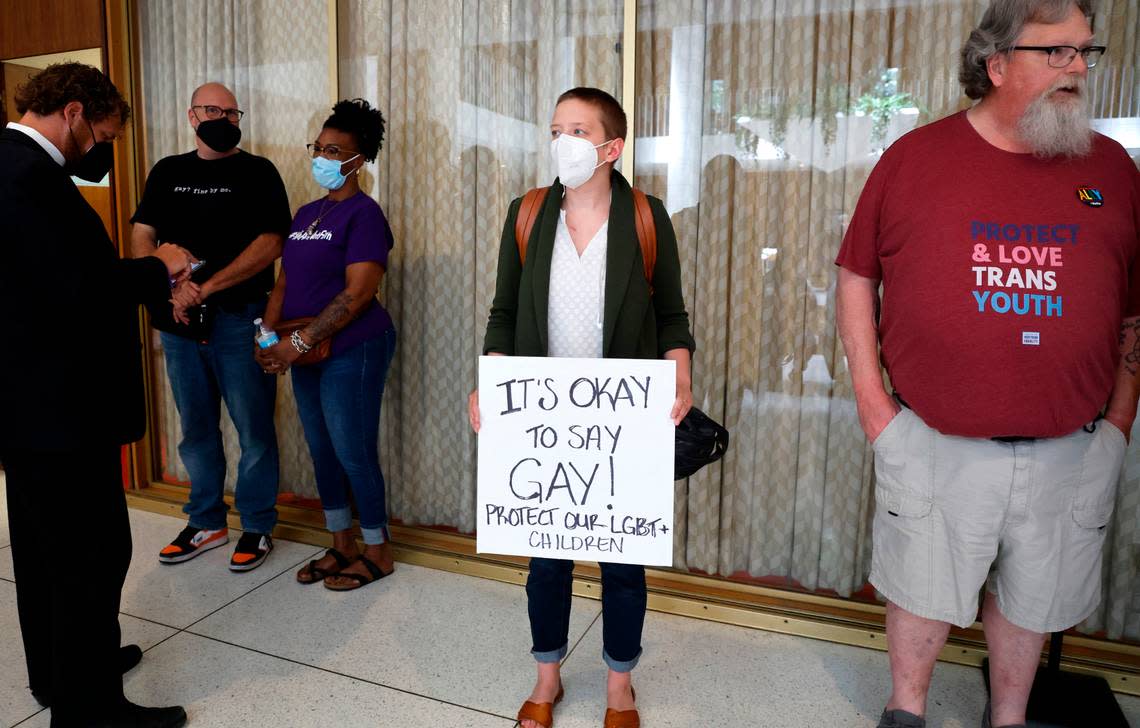NC’s Parents’ Bill of Rights is back in the legislature. What’s in it, and what’s changed.
Republicans have revived the Parents’ Bill of Rights, a bill that bans curriculum on gender identity, sexual activity or sexuality in multiple elementary school grades. The measure also requires schools to make textbooks and other materials available for parental review at the schools and online.
If a student changes the pronoun the school refers to them by, the bill would require notification of a parent in most circumstances. A previous version of the bill was criticized for potentially outing LGBTQ students.
The new bill, if passed into law, would ban curriculum about gender identity and sexuality for kindergarten through fourth grade, while the version that passed the Senate in 2022 would have banned the curriculum in K-3.
What’s also different this year is that Republicans have a supermajority in the Senate and nearly have one in the House, which did not take up the bill last year that would have almost certainly been vetoed by Democratic Gov. Roy Cooper. Now Republicans are one vote shy of being able to override Cooper’s vetoes.
Senate leader Phil Berger has said the bill would be taken up early in the legislative session, which began in January. Asked if the bill would be fast-tracked, Berger told reporters on Tuesday that it would “be ready to move.” A fast-tracked bill is one that moves through committee and to the floor quickly after being introduced, sometimes within a week.
What to know about the bill:

Banning curriculum in K-4
In a section about “age-appropriate instruction,” the bill bans curriculum for kindergarten through fourth grade on “gender identity, sexual activity, or sexuality.”
“Curriculum” is defined as “standard course of study and support materials, locally developed curriculum, supplemental instruction, and textbooks and other supplementary materials.”
It does not include teachers and staff responding to student-initiated questions, the bill states.
What happened to the 2022 Parents’ Bill of Rights?
When a similar bill moved through the Senate in May 2022, it would have required notifying parents of “changes in the name or pronoun used for a student” at school, and would ban “instruction on sexual orientation or gender identity” in K-3 curriculum, The N&O previously reported. Cooper and Senate Democrats compared it to Florida’s “Don’t Say Gay” bill.
Former Republican Sen. Deanna Ballard said last year that the bill is “in no way restricting or prohibiting any conversation” in classrooms. “If a teacher has a same-sex partner, we’re not stifling discussion,” she said.
Democratic senators also described the bill as an undue burden on teachers and schools.
The House did not take up the bill last year.
Ballard lost her Republican primary election last year. The lead sponsors of the 2023 bill are Sens. Amy Scott Galey, Michael Lee and Lisa Stone Barnes, who are all Republicans.
The full title of new Senate Bill 49 is “An Act to Enumerate the Rights of Parents to Direct the Upbringing, Education, Health Care and Mental Health of their Minor Children.”
What’s the provision about pronouns?
▪ “Prior to any changes in the name or pronoun used for a student in school records or by school personnel, notice to the parent of the change.”
The bill also calls for encouraging the student to talk with their parents.
It says an exception to providing records to parents would be:
▪ “When a reasonably prudent person would believe that disclosure would result in the child becoming an abused juvenile or neglected juvenile.”
What’s in the Parents’ Bill of Rights?
Here’s what the bill lists as parents’ rights, as long as they comply with other state laws:
▪ “The right to consent or withhold consent for participation in reproductive health and safety education programs,
▪ “The right to seek a medical or religious exemption from immunization requirements,
▪ “The right to review statewide standardized assessment results as part of the State report card.
▪ “The right to request an evaluation of their child for an academically or intellectually gifted program, or for identification as a child with a disability,
▪ “The right to inspect and purchase public school unit textbooks and other supplementary instructional materials,
▪ “The right to access information relating to the unit’s policies for promotion or retention, including high school graduation requirements,
▪ “The right to receive student report cards on a regular basis that clearly depict and grade the student’s academic performance in each class or course, the student’s conduct, and the student’s attendance,
▪ “The right to access information relating to the State public education system, State standards, report card requirements, attendance requirements, and textbook requirements,
▪ “The right to participate in parent-teacher organizations,
▪ “The right to opt out of certain data collection for their child,
▪ “The right for students to participate in protected student information surveys only with parental consent,
▪ “The right to review all available records of materials their child has borrowed from a school library.”
Other parts of the bill address parental involvement in schools, including policies to increase involvement and access to curriculum materials.
How do materials reviews work?
▪ Establish procedures for parents to inspect and review “all textbooks and supplementary instructional materials that will be used in their child’s classroom.” The policy would make schools have materials available for parents to review at the school and on the school’s website.
▪ For reproductive health and safety education, the bill also requires a process for parents to review materials for and consent to participation.
▪ For students in kindergarten through third grade, parents would have to consent to and have a copy of “any student well-being questionnaire or health screening form.”
